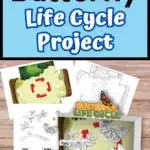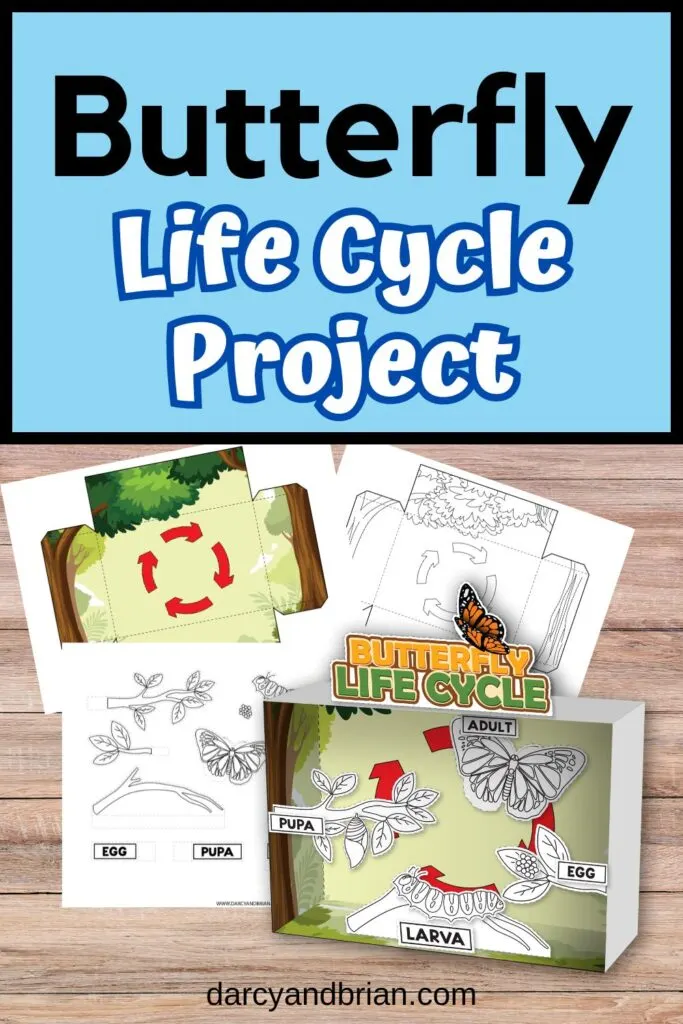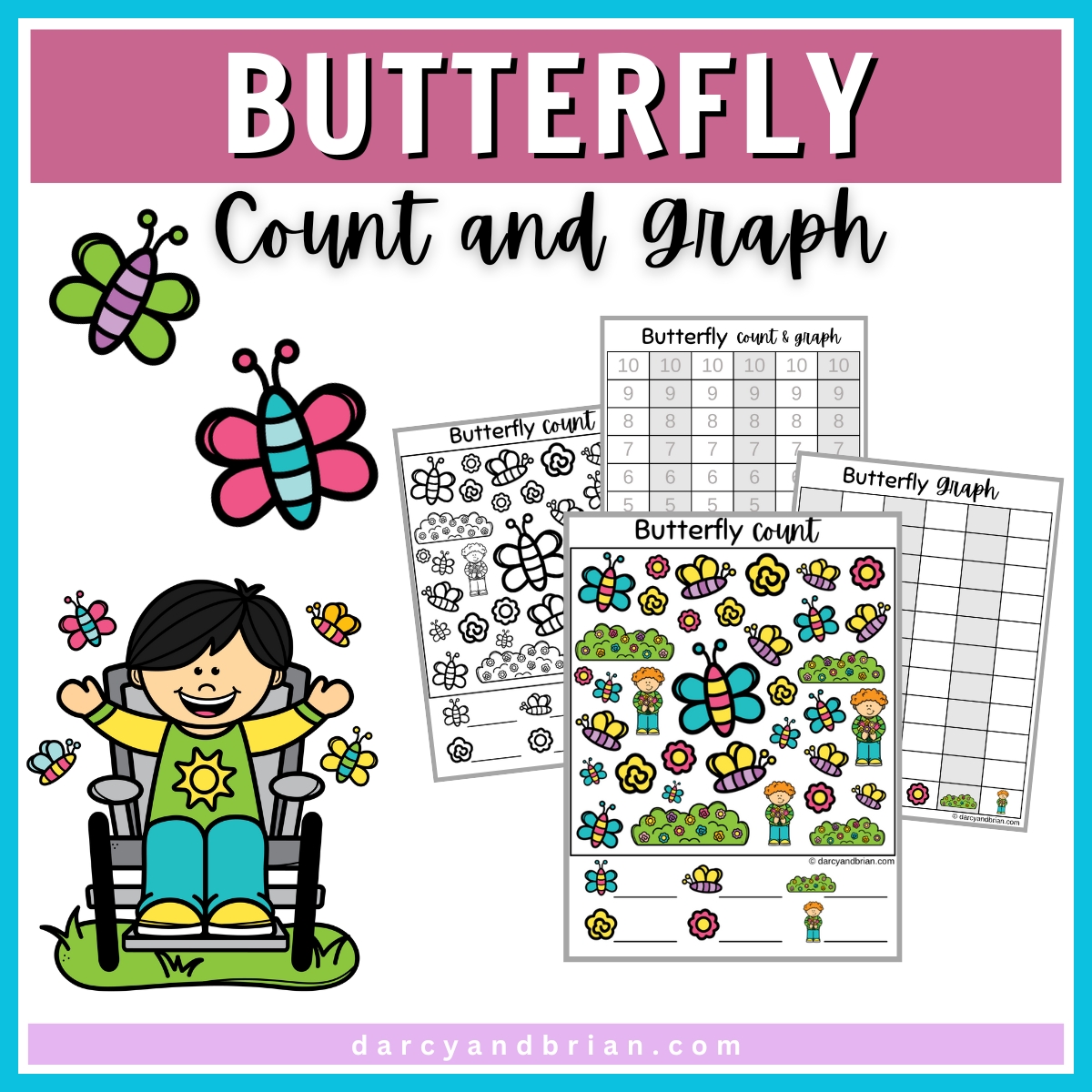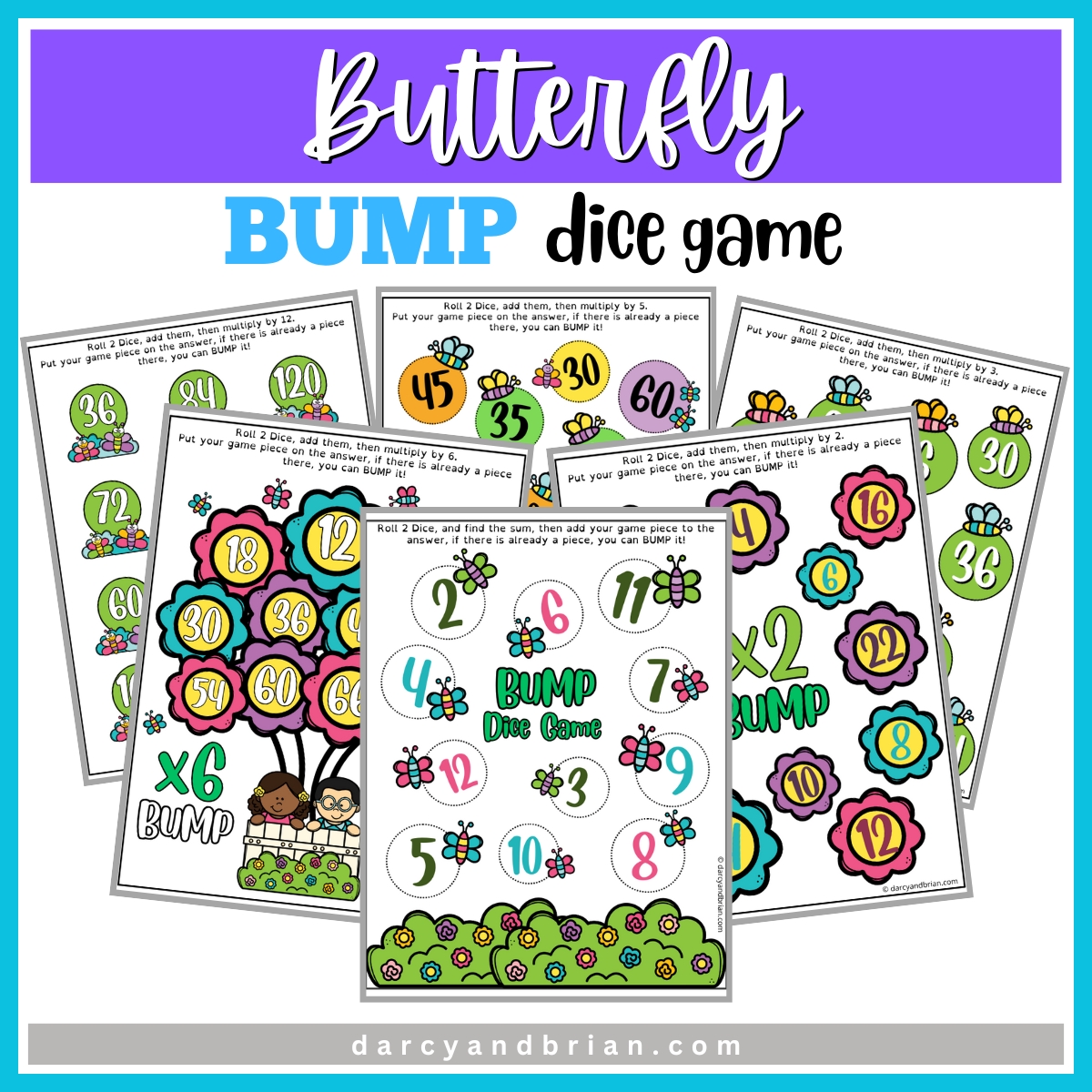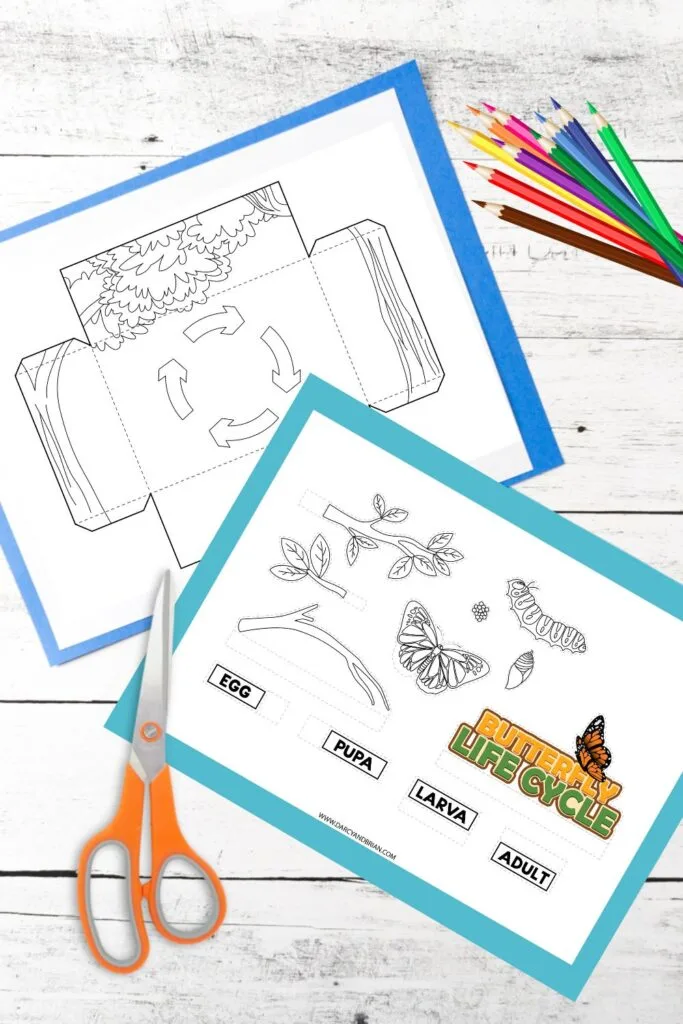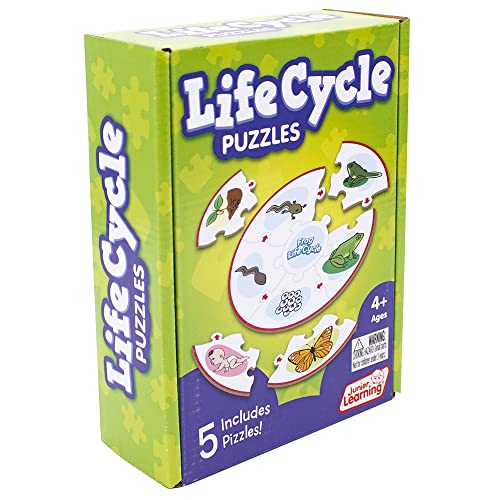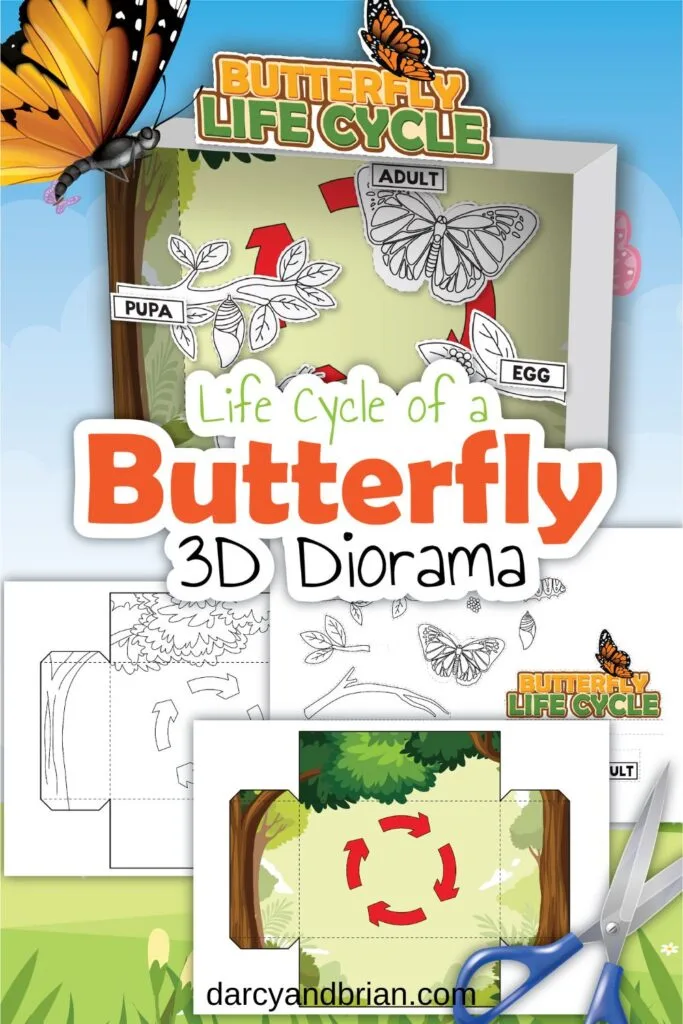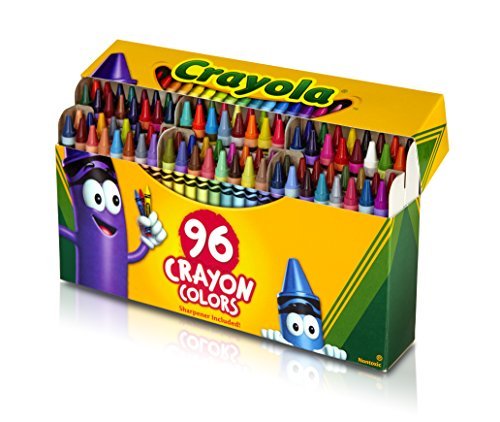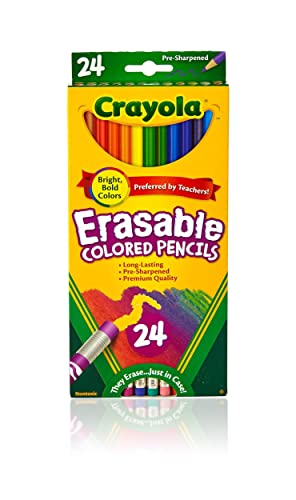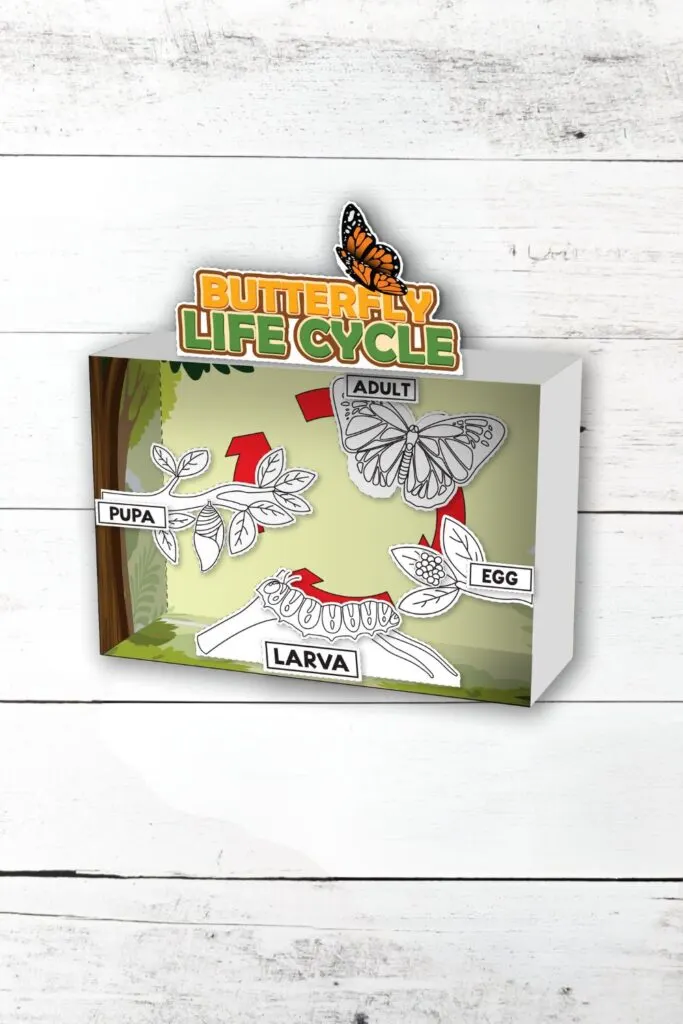Are you looking for butterfly activities for kids that combine creativity with learning? This butterfly life cycle project for kids is an exciting way to explore the fascinating journey of these beautiful creatures.
This engaging project includes a 3D diorama printable set, allowing children to craft a visual representation of each stage of metamorphosis.
It is a fantastic option for a fun home activity and an excellent resource for science lessons in both homeschooling and classrooms. What a fun way to make the study of nature interactive and educational.
Life Cycle of a Butterfly Project Learning Benefits
Engaging in the butterfly life cycle project offers numerous learning benefits for kids.
As they explore the stages of metamorphosis through the 3D diorama, they learn about biological processes and the wonders of nature.
This hands-on activity reinforces scientific concepts and enhances fine motor skills through coloring, cutting, and assembling their diorama.
Additionally, this project pairs well with our butterfly life cycle coloring sheet and our butterfly life cycle booklet.
Together they provide a rounded educational experience that encourages creativity while solidifying their knowledge of butterflies and their transformations.
Butterfly Count and Graph Butterfly Bump Dice Game
Butterfly Bump Dice Game
Why Is It Important for Kids to Learn About Life Cycles?
Understanding life cycles is important for kids, as it sets the stage for grasping biological processes and ecosystems.
When they learn about plant and animal life cycles, they begin to see how interconnected life is and the roles different species play in our environment.
This kind of knowledge sparks curiosity and encourages critical thinking as students dive into growth, development, and adaptation concepts.
Integrating life cycle studies into science lessons meets educational standards and enhances the curriculum by making abstract ideas more tangible through visible changes.
By adhering to the Next Generation Science Standards (NGSS), educators can incorporate life cycle lessons that satisfy key performance expectations related to life sciences and provide a comprehensive and engaging learning experience.
Additionally, these studies often meet Common Core State Standards for literacy in science, engaging students in reading and writing about scientific concepts, thereby enhancing their comprehension and articulation of complex ideas.
Fun Life Cycle Activities for Kids
Life cycle activities encourage inquiry-based learning, a key focus in many state standards. They empower students to ask questions, conduct experiments, and share their discoveries.
By integrating life cycle studies into the curriculum, educators meet established educational benchmarks and promote a comprehensive understanding of biological connections, critical thinking, and a passion for learning.
These lessons can ignite a love for science, inspiring children to observe and engage with nature and ultimately nurturing a generation of informed and enthusiastic learners.
- Butterfly Life Cycle Craft
- Butterfly Life Cycle Sensory Bin
- Ladybug Life Cycle Printable Activities
- Printable Praying Mantis Life Cycle Lapbook
- Shark Life Cycle Activities and Resources
This post contains affiliate links. As an Amazon Associate and a participant in other affiliate programs, we earn a commission on qualifying purchases.
Life Cycle Learning & Education Toys, Montessori Toys Animal Toy FigurinesMontessori Life Cycle Animal Figurines Learning & Education ToysMomoplay Life Cycle Toys, Spider Life Cycle10pcs Animal Life Cycle Figurines of Frog and SalmonJunior Learning Life Cycle Science Learning PuzzlesSafari Ltd. Life Cycle of a Luna Moth
What’s Included in This Printable
This printable diorama activity includes a full-color version of the back and a black-and-white version, allowing children to personalize their projects through coloring.
Additionally, a dedicated page contains individual parts for each stage of the butterfly life cycle, complete with labels to aid in identification and understanding.
These components make it easy for kids to assemble their dioramas accurately.
Supplies Needed
The first essential supply is the diorama project printables, which you can get for free by filling out the form at the bottom of this post.
Printing these templates on cardstock provides more stability for standing up on display.
In addition to the printables, kids will need coloring supplies such as markers, crayons, or colored pencils to decorate them.
Scissors are necessary to cut out the printed parts. You will also need glue or tape for assembly.
Arteza Kids Colored Pencils, Set of 48 Vibrant Colors, Triangular, Pre-Sharpened Crayola Classic Color Crayons in Flip-Top Pack with Sharpener, 96 Colors
Crayola Classic Color Crayons in Flip-Top Pack with Sharpener, 96 Colors Epson EcoTank ET-3710 Wireless Color Inkjet All-in-One Supertank Printer, White
Epson EcoTank ET-3710 Wireless Color Inkjet All-in-One Supertank Printer, White Crayola Erasable Colored Pencils 24 count
Crayola Erasable Colored Pencils 24 count
How to Use the Butterfly Life Cycle Project Printables
Begin by printing out the provided diorama templates on cardstock for enhanced durability. You can encourage kids to color each piece creatively before carefully cutting everything out.
Once completed, have them fold the back piece along the dashed lines to create a small box, adding a 3D effect to the diorama. You can also glue the background within a box for a fuller scene.
Use the project as a teaching tool to discuss the transformative journey of a caterpillar into a butterfly, emphasizing how this cycle repeats itself in nature.
This interactive activity is a fantastic reference for reading books about butterflies. It can easily be included in a unit study on butterflies or insects, making it an ideal spring science lesson.
To enhance the learning experience, consider setting up the diorama and ordering a butterfly growing kit, allowing children to observe the larval to adult butterfly stages as they occur right before their eyes.
What Age Is This Project For?
This butterfly life cycle project is ideally suited for children of all ages, as the concepts of metamorphosis can be fascinating and accessible to everyone.
Elementary-aged children will find they can work on this project more independently, enhancing their understanding as they engage in the hands-on activity.
Preschoolers can also participate actively, particularly in coloring the pieces, although they may require assistance when it comes to cutting and assembling the diorama.
This collaborative approach allows younger children to benefit from the learning experience while still fostering a sense of creativity and accomplishment with help from older siblings or adults.
Butterfly Books for Kids
Introducing children to butterfly-themed books can enhance their learning experience, giving them a deeper understanding of these fascinating insects.
Stories such as “The Very Hungry Caterpillar” by Eric Carle and reference books like “Butterflies and Moths” showcase beautiful illustrations and present engaging information that teach children about butterflies’ life cycles and habits.
Reading helps develop vocabulary development, comprehension, and critical thinking skills.
Additionally, it encourages imagination and curiosity, inspiring children to ask questions and explore the world of butterflies beyond the printed page.
Butterflies for Kids: A Junior Scientist’s Guide to the Butterfly Life Cycle and Beautiful Species to DiscoverExplore My World ButterfliesNational Geographic Readers: Caterpillar to ButterflyNational Geographic Readers: Great Migrations ButterfliesHello, Little One: A Monarch Butterfly StoryAll Things Butterflies For Kids: Filled With Plenty of Facts, Photos, and Fun to Learn all About Butterflies
By incorporating butterfly literature into their learning, kids can develop a stronger appreciation for nature while solidifying their knowledge through interesting facts and storytelling.
Additional Butterfly Learning Activities
Creating a themed week or unit study focused on butterflies is an exciting way to engage students across multiple subjects while exploring the wonders of nature.
Educators can foster an interdisciplinary approach that combines science, art, literacy, and math by incorporating various butterfly learning activities.
For example, have students write poems or haikus about butterflies, which can help develop their creative writing skills.
Below is a curated list of activities that can be integrated into a week-long or month-long curriculum, making the learning experience comprehensive and enjoyable:
- Butterfly Math Worksheets
- Butterfly Headband Craft
- Clothespin Butterfly Craft
- Butterfly Beginning Sounds
- Butterfly Matching Game Printable
This butterfly life cycle project enhances children’s understanding of metamorphosis and ignites their curiosity and creativity through hands-on learning.
This activity encourages inquiry-based exploration and integrates multiple educational disciplines, making science fun and accessible.
As you facilitate this project, you’ll witness your students develop critical thinking skills, a love for nature, and a deeper appreciation for the world around them.
Don’t miss out on the opportunity to bring this enriching experience to your home or classroom—fill out the form below to receive your free diorama printables and start this exciting journey with your kids today!

Darcy is the founder of “Life With Darcy and Brian,” where she combines her love for education, board games, and crafting to create engaging learning experiences for kids. Her creative projects and writing have been featured in outlets like The Toy Insider, CafeMom, Mom.com, Parents.com, Country Living, and The Pioneer Woman.

